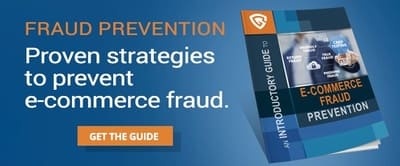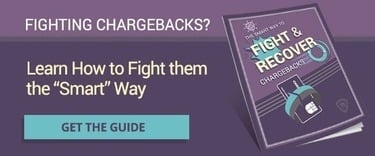How to Fight Airline and Travel Agency Chargebacks
Table of Contents
- What Kind of Fraud Targets the Air Travel Industry?
- What Is Friendly Fraud?
- How Can Airlines and Travel Agencies Fight Chargebacks?
- The Benefits of Professional Chargeback Management
- What Are the Root Causes of Chargebacks?
- Can You Refuse a Chargeback?
Airlines and travel agencies are in an unfortunate situation when it comes to chargebacks. They're frequent targets of true fraud, which means they face a lot of legitimate chargebacks from fraud attempts that sneak through the filters. They're also frequent targets of friendly fraud from dissatisfied customers that are frustrated with their inability to get a refund when they miss their flight or need to cancel.
This double-whammy makes chargeback management especially important. If merchants in the travel industry don't take effective steps to fight and prevent chargebacks, they stand to lose a significant percentage of their revenue. Let's take a look at some of the root causes behind travel chargebacks and what merchants can do to fight back and protect their bottom line.
Travel fraud comes in many different forms. Some fraudsters take over accounts in order to trade mileage points and other loyalty rewards on the dark web, others use the high transaction volume and frequent cancellations of the travel business to test out stolen card numbers without arousing suspicion, and some really just want to fly somewhere for free.
 According to information from a report by the International Air Transport Association, airlines are the industry most affected by online fraud, with 46% of total online fraud targeting the air travel industry. That fraud is also growing rapidly, increasing 61% from 2018 to 2019.
According to information from a report by the International Air Transport Association, airlines are the industry most affected by online fraud, with 46% of total online fraud targeting the air travel industry. That fraud is also growing rapidly, increasing 61% from 2018 to 2019.
While airlines may be able to bear some of these costs, it’s much harder for smaller, independent travel agencies who operate on slender margins to survive under high fraud or chargeback rates. For these merchants, it is extremely important to make use of appropriate fraud prevention methods and fight back against illegitimate chargebacks.
What Kind of Fraud Targets the Air Travel Industry?
One reason fraudsters like to pick on travel agents in particular is that they function as intermediaries between the customer and the airline, which can create ambiguities and confusion that the fraudsters will work to exploit.
The fraudster may assume that a small travel agency won’t have the same anti-fraud tools or screening procedures as a big airline, so they try to get travel agents to authorize transactions on a stolen card by impersonating the cardholder.
Online, this can be quite easy to do, especially if the travel agent isn’t following strict procedures for verifying customer identities before processing transactions on their behalf. When the card’s real owner disputes the purchase later, the travel agent’s agreements with the airline may leave them on the hook for the chargeback.
Account takeover is a pervasive threat as well, since frequent flyers often store their payment credentials for future use. If a fraudster gets access to the customer's username and password, they can use those stored credentials to make purchases that can be harder to identify as fraudulent.
Loyalty program fraud is far more common in air travel than in most other industries, since frequent-flyer miles are perhaps the most well-known customer rewards system in the world. Fraudsters will often seek to gain access to a customer's account and use their miles to book a flight, avoiding the more stringent checks on credit card purchases.
One of the most difficult problems to get a handle on, however, is friendly fraud. That's because it can often be indistinguishable from true fraud at first glance, leaving merchants uncertain whether they’re dealing with customers who are trying to abuse the system or those who are victims of fraud.
What Is Friendly Fraud?
Sometimes cardholders do this because they’re confused, either about the transaction itself or about how the chargeback process is supposed to work, but sometimes they do it knowing that they’re defrauding the merchant. In many cases, the customer understood the policies they were agreeing to when they agreed to them, but believe that their unique circumstances should entitle them to an exception.
Communication and excellent customer service can usually resolve issues with customers who don't mean any harm. On the other hand, long wait times, limited availability, or unhelpful customer service representatives can often turn a simple misunderstanding into a chargeback.
Chargeback alert services and programs like Order Insight can provide merchants with a window of opportunity to resolve customer complaints before the chargeback takes effect, either by giving them a refund or by clearing up any misconceptions that prompted the dispute.
 They can also deter some cases of intentional chargeback fraud by revealing that the merchant is in communication with the bank and has more information than the fraudster might realize.
They can also deter some cases of intentional chargeback fraud by revealing that the merchant is in communication with the bank and has more information than the fraudster might realize.
Unfortunately, those not-so-friendly fraudsters who are engaging in deliberate chargeback fraud aren’t always so easy to neutralize. There are two reasons why it's important to fight these chargebacks: First, because with the right evidence you stand a good chance of winning them and recovering your funds. Second, because merchants who don’t fight back may find themselves targeted by the same fraudster again, or may gain a reputation in these circles for being an easy mark.
How Can Airlines and Travel Agencies Fight Chargebacks?
For travel agencies, the most important points are to prove that they validated the cardholder’s identity, that the cardholder authorized the transaction, and that the cardholder agreed to the terms and conditions before finalizing the transaction. All employees should be trained to follow and properly document these steps in case a chargeback ever arises. In addition, many ticketing-related chargebacks can be defeated if you can provide proof that the customer was a passenger on the flight in question.
Travel agencies may not have this information, but they may be able to work with the airline to find out if they have any evidence showing that a passenger on board the flight presented ID matching the name of the cardholder. If you can provide that evidence, most issuing banks will reverse the chargeback.
There is always some subjective interpretation involved in the issuing bank's decision-making. Compelling evidence isn’t always enough, and it can be difficult to prove that a customer’s identity was verified prior to authorizing a transaction or that the cardholder used the purchased ticket. Here are some other examples of potential evidence for air travel disputes:
- Emails between the agency and the customer
- Photographs, emails, or social media showing a relationship between the cardholder and the passenger
- Copies of the cardholder’s signature
- Copies of the cardholder’s passport, driver’s license, or other identification
- Photographs or social media showing that the cardholder was on board the flight or at its destination
- Receipts for related or previous transactions
If you can compile multiple elements of this list into the evidence you submit, you stand a better chance of beating the chargeback.
The Benefits of Professional Chargeback Management
The truth is that fighting chargebacks is a difficult job for any company. Since chargebacks are decided by issuing banks, who vary in their standards of evidence and have some incentive to err on the side of the cardholder, merchants can often be blindsided by decisions to uphold chargebacks that they thought were a sure win.
 Chargeback specialists are experts at preventing and fighting chargebacks. Many of these services use advanced tools like AI and analytics to help their clients identify the root causes of their chargebacks in order to prevent future ones.
Chargeback specialists are experts at preventing and fighting chargebacks. Many of these services use advanced tools like AI and analytics to help their clients identify the root causes of their chargebacks in order to prevent future ones.
They also know the ins and outs of how the major issuing banks decide chargeback cases, enabling them to be far more successful in fighting chargebacks than most merchants.
Doing business in the air travel industry means keeping track of a lot of moving parts, and dealing with the chargebacks and fraud schemes this industry generates isn’t any less hectic. Effective chargeback prevention starts at the policy level, with the procedures you put in place to validate customer identities and document your process so that you can make the most compelling case for yourself when the inevitable friendly fraud chargebacks hit you.
Just remember that if your chargeback rates get too high, there’s always help to be found—the right chargeback management firm can analyze your situation and help you put together the right strategy to get it under control.
FAQ
What Are the Root Causes of Chargebacks?
Can You Refuse a Chargeback?
Thanks for following the Chargeback Gurus blog. Feel free to submit topic suggestions, questions, or requests for advice to: win@chargebackgurus.com



